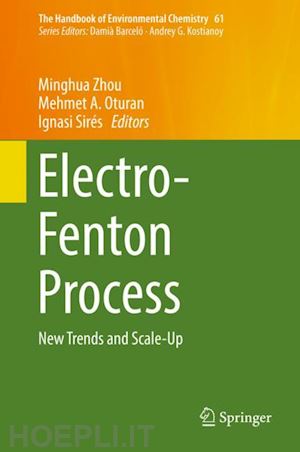
Questo prodotto usufruisce delle SPEDIZIONI GRATIS
selezionando l'opzione Corriere Veloce in fase di ordine.
Pagabile anche con Carta della cultura giovani e del merito, 18App Bonus Cultura e Carta del Docente
This volume discusses the theoretical fundamentals and potential applications of the original electro-Fenton (EF) process and its most innovative and promising versions, all of which are classified as electrochemical advanced oxidation processes. It consists of 15 chapters that review the latest advances and trends, material selection, reaction and reactor modeling and EF scale-up. It particularly focuses on the applications of EF process in the treatment of toxic and persistent organic pollutants in water and soil, showing highly efficient removal for both lab-scale and pre-pilot setups. Indeed, the EF technology is now mature enough to be brought to market, and this collection of contributions from leading experts in the field constitutes a timely milestone for scientists and engineers.
Electro-Fenton Process: Fundamentals and Reactivity.- Bio-electro-Fenton: A New Combined Process. Principles and Applications.- The Electro-peroxone Technology as a Promising Advanced Oxidation Process for Water and Wastewater Treatment.- Heterogeneous Electro-Fenton Process: Principles and applications.- Modified Cathodes with Carbon-Based Nanomaterials for Electro-Fenton Process.- Advances in carbon felt material for electro-Fenton process.- Cathode Modification to Improve Electro-Fenton Performance.- Conventional Reactors and Microreactors in Electro-Fenton.- Cost-Effective Flow-Through Reactor in Electro-Fenton.- Reactor Design for Advanced Oxidation Processes.- Modelling of Electro-Fenton Process.- Solar Assisted Electro-Fenton Systems for Wastewater Treatment.- Electro-Fenton Applications in the Water Industry.- The Application of Electro-Fenton Process for the Treatment of Artificial Sweeteners.- Soil Remediation by Electro-Fenton Process.
Minghua Zhou obtained his Ph.D. from Zhejiang University (China) in 2003, and then served there as an assistant and an associate professor from 2003 to 2006. After his postdoctoral research at the University of Sydney for two years, he was recruited as a full Professor by Nankai University in 2008. His research interests include water and wastewater treatment, environmental catalysis and materials, microbial fuel cells and advanced oxidation processes, particularly Electrochemical Advanced Oxidation Processes including electro-Fenton. He has published more than 150 scientific articles, 2 books and 3 book chapters. He is a member of the Editorial Board of several scientific journals, such as Separation Purification Technology.
Mehmet A. Oturan is currently Professor of Exceptional Class at the University Paris-Est and Head of the Environmental Chemistry group. His current research interests include advanced oxidation processes and particularly electrochemical advanced oxidation processes including electro-Fenton process of which he invented the “carbon-felt cathode” version and their application to wastewater treatment and soil remediation. He has supervised 41 PhD, published more than 180 scientific articles, 2 books and 8 book chapters and delivered more than 50 invited talks at national/international scientific congresses and at various institutions. His current h-index is 51 with total citation more than 8000 (Web of Science). He serves now as the Associate Editor of Environmental Chemistry Letters and Sustainable Environmental Research.
Ignasi Sirés obtained his Ph.D. in Chemistry from the Universitat de Barcelona (UB, Spain) in 2007. He also became a Materials Engineer (UB and the Universitat Politècnica de Catalunya). He was awarded the “Oronzio and Niccolò De Nora Foundation Prize in Environmental Electrochemistry” in 2010 (ISE), the “CIDETEC 2011 Prize for Young Researchers in Electrochemistry” (Spain) and the prestigious “Carl Wagner Medal of Excellence in Electrochemical Engineering 2014” (WPEE, EFCE). In 2014 he became Tenured Assistant Professor at the UB. He is interested in all aspects of environmental electrochemistry for wastewater treatment, including new electrode materials, the study of reaction intermediates, process scale-up, the study of coupled cathodic/anodic processes and coupling with solar energy. His major efforts focus on Fenton’s reaction chemistry.











Il sito utilizza cookie ed altri strumenti di tracciamento che raccolgono informazioni dal dispositivo dell’utente. Oltre ai cookie tecnici ed analitici aggregati, strettamente necessari per il funzionamento di questo sito web, previo consenso dell’utente possono essere installati cookie di profilazione e marketing e cookie dei social media. Cliccando su “Accetto tutti i cookie” saranno attivate tutte le categorie di cookie. Per accettare solo deterninate categorie di cookie, cliccare invece su “Impostazioni cookie”. Chiudendo il banner o continuando a navigare saranno installati solo cookie tecnici. Per maggiori dettagli, consultare la Cookie Policy.